KFF Health Tracking Poll – June 2020
Racism, Protests, And Racial Disparities
Key Findings:
- Amid weeks of protests over the death of George Floyd that have drawn national attention to issues of institutional racism and police violence, the latest KFF Health Tracking Poll finds that seven in ten Black adults say they have experienced serious incidents of discrimination in their lifetime, including half who say they have felt their life was in danger because of their race or ethnicity, and about one in five (rising to 30% of Black men) who say they have been a victim of police violence. About six in ten Black adults also report experiencing unfair treatment in various settings in the past 12 months, including four in ten who experienced this while shopping (44%) or at a bar, restaurant, or entertainment venue (41%), and 30% who experienced unfair treatment in interactions with police. Hispanics are also disproportionately likely to report discrimination and unfair treatment compared to Whites, including 45% who report experiencing unfair treatment in the past 12 months and 41% who report ever experiencing specific serious forms of discrimination.
- Majorities of the public overall support two key reforms aimed at reducing the use of excessive force by police – banning police from using chokeholds and strangleholds and banning no-knock warrants – though Republicans are less supportive (52% support banning chokeholds and 34% support banning no-knock warrants). There is broad and bipartisan support for several other police reform proposals, including requiring officers to intervene to stop the excessive use of force by other officers, requiring verbal warnings before shooting, mandatory public release of disciplinary records, and allowing individuals to sue police officers if they feel they were subjected to excessive force.
- Two-thirds of the public support the recent protests against police violence, and 9% say they personally attended a protest or rally in the last 3 months either to protest police violence or in support of Black Lives Matter or other anti-racist causes. At the same time, a majority of the public (56%) say they are worried that recent protests may lead to an increase in coronavirus cases in their area. Democrats and Black adults – groups that are most likely to support the protests – are also among the most likely to say they are worried about the protests leading to an increase in coronavirus cases.
- Big partisan differences remain when it comes to perceptions of racism, protests, and police violence. Large majorities of Democrats say racism (82%) and police violence against the public (65%) are “big problems” in the U.S., while much smaller shares of Republicans agree (25% and 14%, respectively). Conversely, 62% of Republicans compared with 24% of Democrats say “violence caused by protesters” is a big problem. Partisan differences also extend to knowledge about the disparities faced by Black and Hispanic adults when it comes to health care and experiences with police. For example, Democrats are twice as likely as Republicans to know that Black Americans are more likely than White Americans to get sick or die from coronavirus (69% vs. 34%). Similarly, 64% of Democrats know that Black Americans are less likely than White Americans to be covered by health insurance, while most Republicans (70%) say there is no difference. Nearly nine in ten (87%) Democrats know that Black Americans are more likely than White Americans to experience police violence, while 52% of Republicans say there is no difference.
Large Shares Of Black Adults Report Experiences With Racial Discrimination
At a time when protests across the country are highlighting issues of structural racism and discrimination, 63% of Black adults and nearly half (45%) of Hispanic adults say they have been treated unfairly in a variety of situations in the past 12 months because of their race or ethnicity. Most commonly, about four in ten Black adults and about a quarter of Hispanic adults say they have been treated unfairly due to their racial or ethnic background when they were shopping (44% and 28%, respectively) or when they were at a restaurant, bar, theater, or other entertainment place (41% and 25%). Black adults (30%) are nearly three times as likely as Hispanic adults (11%) — and ten times as likely as White adults (3%) to say they have been treated unfairly in dealings with the police due to their race. About one in five Black and Hispanic adults say they have experienced unfair treatment due to their race at work (20% and 18%, respectively) and about one in six say they have been experienced unfair treatment while getting health care (17% and 14%, respectively). Very small shares of White adults say they have experienced any of these types of unfair treatment due to their racial or ethnic background.
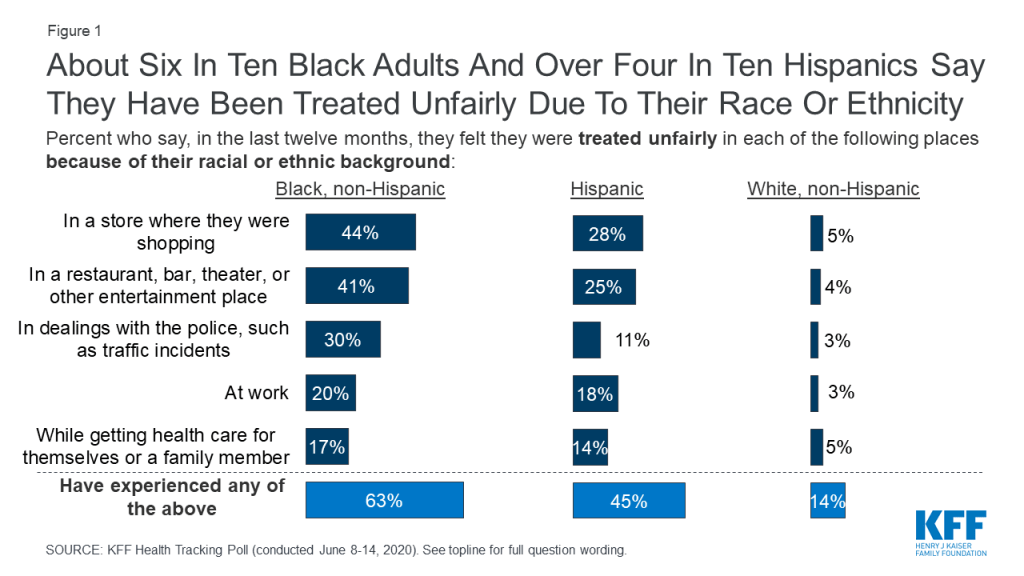
When asked about more specific experiences of discrimination or violence due to their race or ethnicity, the disparities are no less stark. About half of Black adults (48%), including 60% of Black men and 38% of Black women, say they have ever been afraid their life was in danger because of their race. This compares to about a quarter (26%) of Hispanic adults and 16% of White adults. Black adults are also much more likely than Hispanic or White adults to say they have been denied a job for which they were qualified (40%, 15%, and 8%, respectively) or denied housing they could afford due to their race (26%, 8%, and 3%). When it comes to interactions with police, Black adults are more than twice as likely as Hispanic adults and eight times as likely as White adults to say they have been stopped or detained by police because of their racial or ethnic background (41%, 16%, and 5%, respectively). Moreover, about one in five Black adults (21%) – including 30% of Black men – say they have been a victim of police violence due to their racial background. Overall, seven in ten Black adults (71%) say they have ever experienced at least one of these more specific instances of discrimination due to their race or ethnicity, compared with four in ten Hispanics (41%) and a quarter of Whites (24%).
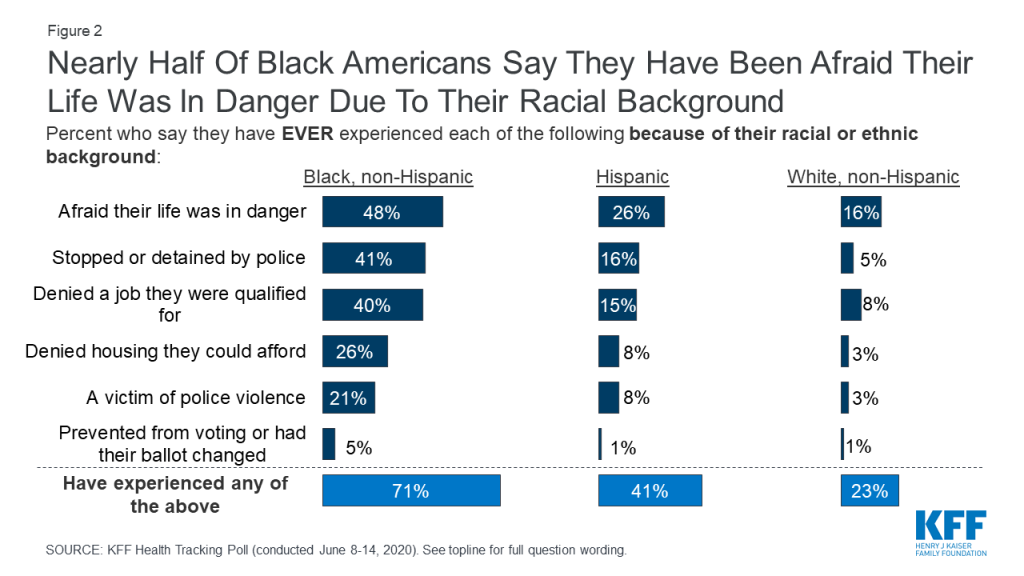
Public Broadly Supports Proposals To Address Police Violence
In recent weeks following the death of George Floyd and ensuing nationwide protests, a number of reforms have been proposed to address police violence and excessive use of force. New York and Iowa have recently banned police from using chokeholds or strangleholds, Congressional Democrats have introduced a police reform bill to address racism and excessive force by police, and U.S. Representatives Justin Amash and Ayanna Pressley have introduced a bill to end qualified immunity for police officers, which would make it easier for victims of police misconduct to successfully sue officers in civil court.1 ,2
When asked about a number of proposals aimed at reducing excessive use of force by police officers, majorities of the public express support. Americans overwhelmingly support requiring police to intervene and stop excessive force used by other officers and report these incidents (95%) and requiring police to give a verbal warning, when possible, before shooting a civilian (89%). About three in four support requiring states to publicly release disciplinary records for law enforcement officers (76%) and allowing individuals to sue police officers if they feel they were subjected to excessive force (73%). Two-thirds support banning police from using chokeholds and strangleholds (68%) and about half (52%) support banning no-knock warrants that allow police to enter a person’s residence unannounced.
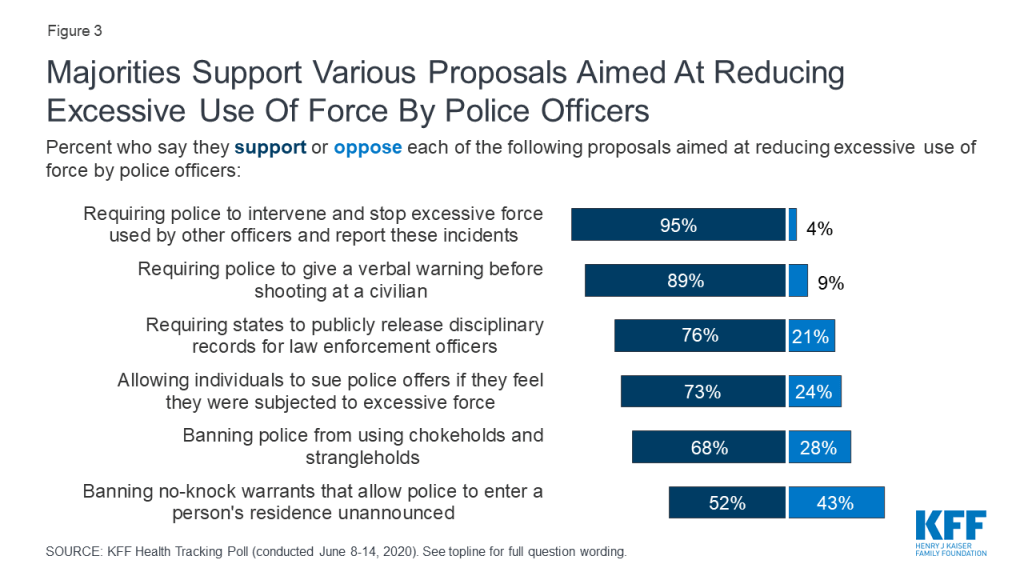
There is bipartisan support for many proposals aimed at reducing police violence, including requiring officers to intervene to stop the excessive use of force by other officers, requiring verbal warnings before shooting, mandatory public release of disciplinary records, and allowing individuals to sue police officers if they feel they were subjected to excessive force. When it comes to banning police from using chokeholds and strangleholds, large majorities of Democrats (82%) and independents (70%) are in support, compared with a bare majority (52%) of Republicans. And while majorities of Democrats and independents support banning no-knock warrants, only about a third of Republicans (34%) support this proposal.
| Table 1: There is bipartisan support for many policies aimed at reducing police violence. | |||
| Percent who support each of the following proposals: | Democrats | Independents | Republicans |
| Requiring police to intervene and stop excessive force used by other officers and report these incidents | 97% | 96% | 95% |
| Requiring police to give a verbal warning before shooting at a civilian | 95 | 90 | 83 |
| Requiring states to publicly release disciplinary records for law enforcement officers | 89 | 75 | 62 |
| Allowing individuals to sue police officers if they feel they were subjected to excessive force | 85 | 74 | 55 |
| Banning police from using chokeholds and strangleholds | 82 | 70 | 52 |
| Banning no-knock warrants that allow police to enter a person’s residence unannounced | 65 | 56 | 34 |
Most Support Recent Protests Against Police Violence; One in Ten Say They Have Participated
About two in three Americans (64%) support the recent protests against police violence while three in ten oppose the protests (30%). There are sharp partisan divisions on the recent protests with an overwhelming majority of Democrats (86%) and two in three independents (67%) saying they support the protests while about six in ten Republicans (57%) oppose. Majorities across racial/ethnic groups support the protests including about eight in ten Black Americans (84%) and about six in ten White Americans (61%) and Hispanics (64%).
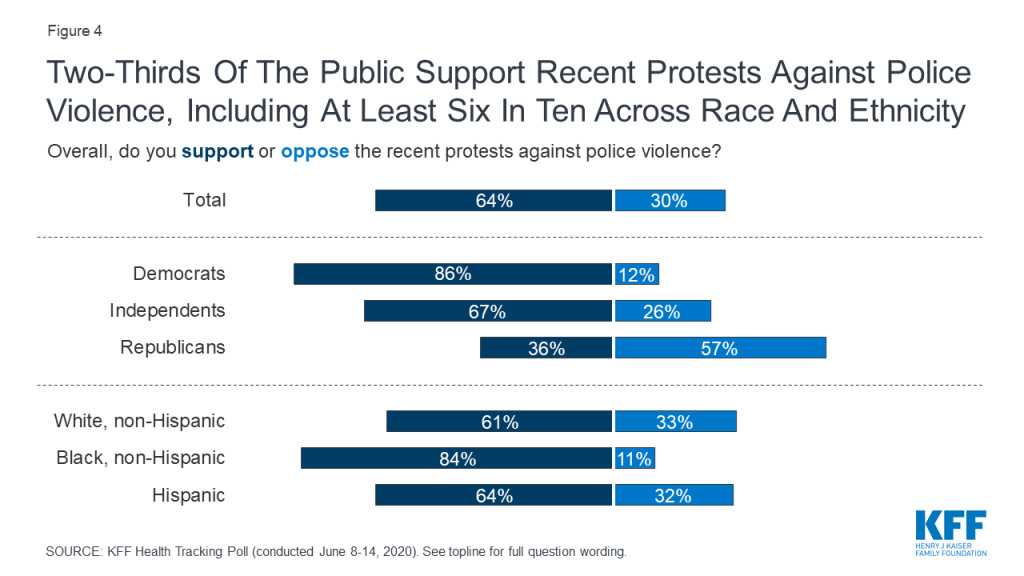
At the same time that a majority of the public supports the recent protests, more than half (56%) say they are very or somewhat worried that protests may lead to an increase in coronavirus cases in their area. Notably, Democrats and Black adults – groups that are most likely to support the protests – are also among the most likely to say they are worried about the protests leading to an increase in coronavirus cases (73% and 68% respectively).
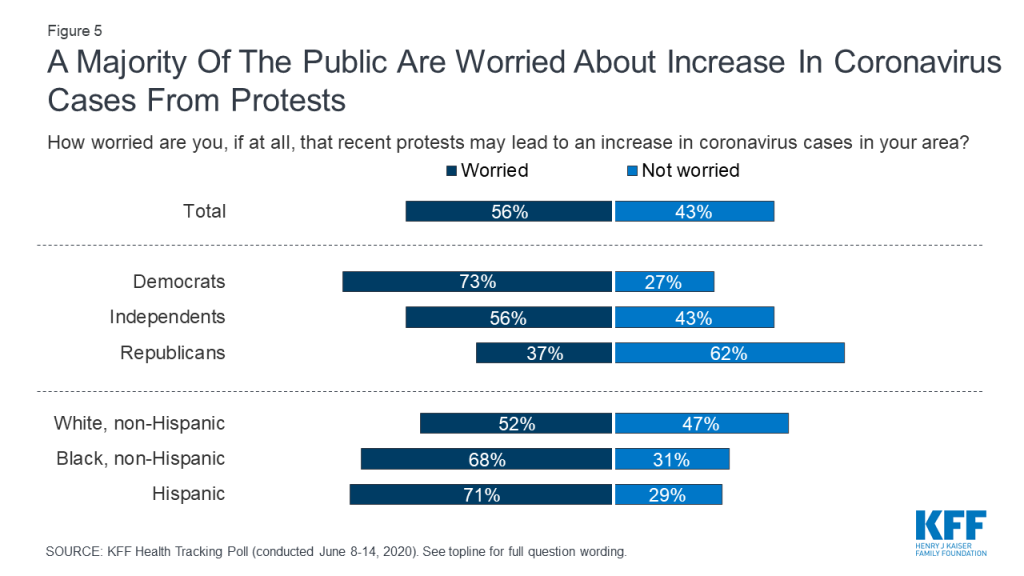
Eleven percent of adults say they have attended a protest, march, or demonstration in the last three months, including 9% who say they attended an event to protest police violence or in support of Black Lives Matter or other anti-racist causes (less than 1% of adults say they attended a protest to ease stay-at-home restrictions implemented due to coronavirus in the past three months). While a majority of Americans are worried that recent protests may lead to an increase in coronavirus cases in their area, most of those who say they attended a protest or demonstration in the last 3 months say they are not too worried (29%) or not at all worried (49%) that they may have exposed themselves to coronavirus when attending such an event.
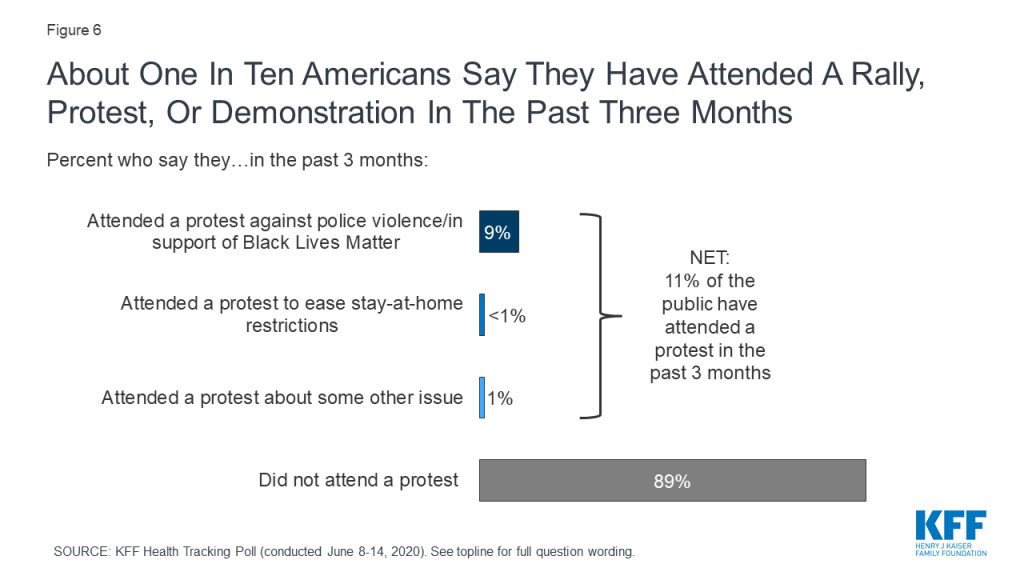
Who are the 9% of Americans who have been protesting police violence and racism in the past few months? Recent protesters are likely to be younger adults, with more than eight in ten being under 50 years old, including half (52%) who are between the ages of 18 to 29. Most of those who report attending recent protests against police violence and racism are college graduates (53%). These protesters are likely to be Democrats (42%) or independents (46%) with just 6% of protesters identifying as Republicans.
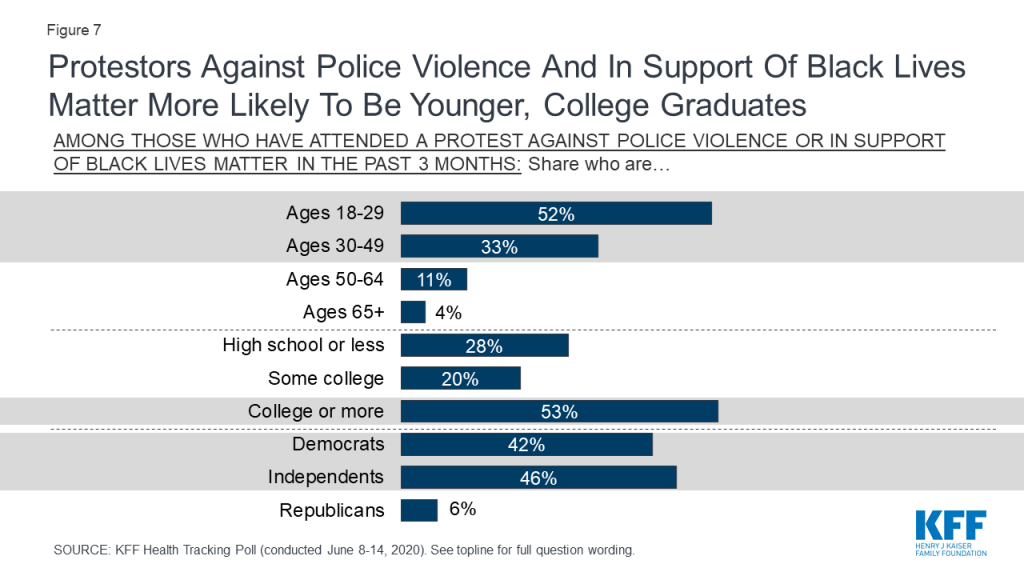
Partisans Differ in Perceptions of Racism, Police Violence, and Protests as Problems
Large shares of Americans view racism, police violence, and violence caused by protesters as at least somewhat of a problem in the U.S. today. About six in ten (58%) say racism is a “big problem,” while about four in ten say the same about police violence against the public (42%) and violence caused by protesters (38%).
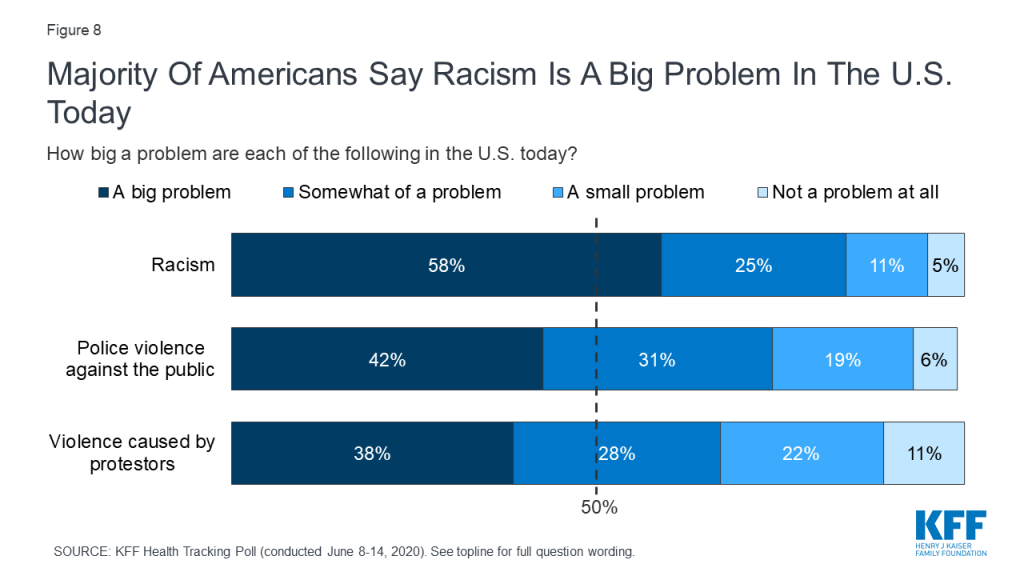
While majorities across racial and ethnic groups view racism as a big problem in the U.S., the share is largest among Black adults (85%) compared with those who are Hispanic (62%) or White (53%). Racial and ethnic divisions are deeper when it comes to perceptions of the problem of police violence – 77% of Black adults say police violence against the public is a big problem, compared with just under half (47%) of Hispanic adults and about a third (34%) of White adults.
Partisan divisions in perceptions of these problems run deep. Eight in ten Democrats (82%) and a majority of independents (59%) say racism is a big problem in the U.S. today, compared with 25% of Republicans who say the same. Democrats are much more likely to say police violence is a big problem (65%) than violence caused by protesters (24%). Conversely, Republicans are much more likely to say violence caused by protesters is a big problem (62%) than to say the same of police violence against the public (14%).
| Table 2: Black adults, Democrats are more likely to say police violence is a “big problem” | ||||||
| Percent who say each of the following is a “big problem” in the U.S. today: | Party ID | Race/Ethnicity | ||||
| Democrats | Independents | Republicans | White | Black | Hispanic | |
| Racism | 82% | 59% | 25% | 53% | 85% | 62% |
| Police violence against the public | 65 | 41 | 14 | 34 | 77 | 47 |
| Violence caused by protesters | 24 | 36 | 62 | 39 | 27 | 45 |
Many Recognize Racial Disparities in Health Care and Experiences with Police Violence, but Partisan Perceptions Diverge
Overall, many adults in the U.S. recognize the disparities faced by Black and Hispanic people when it comes to health care and interactions with the police. Seven in ten adults (69%) think Black Americans are more likely than White Americans to experience police violence and a majority (56%) think Hispanic Americans are more likely than White Americans to experience police violence. A KFF analysis has shown that early data suggest coronavirus is disproportionately affecting communities of color.3 Half of the public (50%) recognize that Black Americans are more likely to get sick or die from coronavirus while fewer (36%) are aware of the disproportionate impact of coronavirus on Hispanics.4 About four in ten Americans think Black adults and Hispanic adults are more likely than their White counterparts to receive poor quality health care (42% and 38%, respectively) and to lose their job or income as a result of coronavirus (40% and 44%, respectively). More than four in ten think Black and Hispanic adults are less likely to be able to access the health care they need (44% and 45%, respectively) or to be covered by health insurance (45% and 49%, respectively).
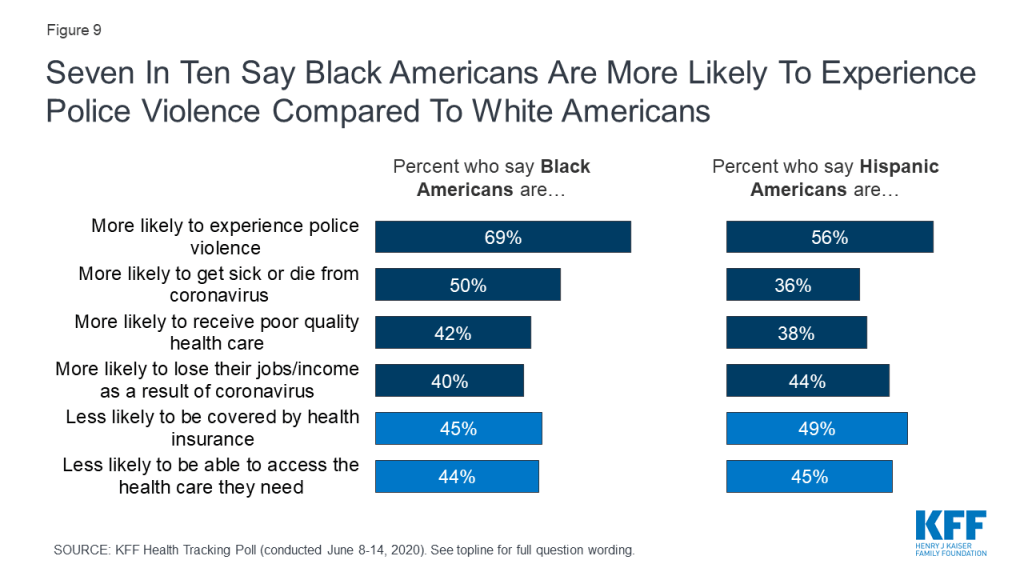
There are partisan differences in perceptions and knowledge of disparities faced by Black and Hispanic adults when it comes to health care and experiences with police. Democrats are twice as likely as Republicans to know that Black Americans are more likely than White Americans to get sick or die from coronavirus (69% vs. 34%). Similarly, 64% of Democrats know that Black Americans are less likely than White Americans to be covered by health insurance, while most Republicans (70%) say there is no difference. Nearly nine in ten Democrats (87%) know that Black Americans are more likely than White Americans to experience police violence, while 52% of Republicans say there is no difference.
| Table 3: Democrats and independents are more likely than Republicans to recognize disparities faced by Black and Hispanic Americans | ||||||
| Compared to White Americans, do you think Black Americans are more or less likely to… | Compared to White Americans, do you think Hispanic Americans are more or less likely to… | |||||
| Democrats | Independents | Republicans | Democrats | Independents | Republicans | |
| …experience police violence | ||||||
| More likely | 87% | 73% | 38% | 77% | 59% | 25% |
| Less likely | 2 | 4 | 7 | 2 | 3 | 3 |
| No difference | 11 | 21 | 52 | 20 | 36 | 71 |
| …get sick or die from coronavirus | ||||||
| More likely | 69 | 47 | 34 | 57 | 36 | 15 |
| Less likely | 1 | 3 | 2 | 3 | 4 | 2 |
| No difference | 29 | 46 | 62 | 36 | 56 | 81 |
| …be covered by health insurance | ||||||
| More likely | 5 | 6 | 10 | 8 | 7 | 8 |
| Less likely | 64 | 48 | 18 | 64 | 51 | 29 |
| No difference | 26 | 42 | 70 | 24 | 39 | 63 |
Coronavirus, Delayed Care And 2020 Election
Key Findings:
- Amid easing social distancing restrictions, the latest KFF Health Tracking Poll finds that people in the U.S. are venturing out of their homes more frequently than they did two months ago, including just over half who say they visited with close friends or family and three in ten who report dining at a restaurant in the past week. Many of those who have engaged in these activities say they are worried about exposing themselves to coronavirus when they do so, including about half who worry about exposure while shopping for essential items and four in ten who worry about exposing themselves at work.
- Partisan differences exist, with Republicans more than twice as likely as Democrats to report dining at a restaurant (46% vs. 21%) and Democrats more likely than Republicans to say they worry about potential coronavirus exposure when they do venture out.
- About half of adults (52%) say they or another family member in their household skipped or postponed some type of medical or dental care because of coronavirus, including 42% who personally skipped or postponed care. In May, similar shares (48%) said they or a family member skipped or delayed care due to the coronavirus. Dental care was the most likely to be skipped or postponed, followed by regular check-ups or physical exams. The most common reason for skipping care was that the provider’s office or facility was closed or offering only limited appointments (82%), but about half of those who say they or a family member postponed care say that feeling unsafe about visiting a medical facility during the outbreak was a reason for their decision.
- The poll also examined voters’ views of the biggest problem facing the country and voter preference on who they trust to better handle issues such as health care, the economy, and the coronavirus outbreak. Voters give President Trump a slight edge over Democrat Joe Biden in trust to handle the economy, but prefer Biden when it comes to handling health care and coronavirus.
Public Reports Easing Up On Social Distancing In Recent Weeks, Though Many Still Worry About Coronavirus Exposure
As most states move to ease social distancing restrictions, the latest KFF Health Tracking Poll finds that U.S. adults report venturing out of their homes to go to work, shop, or visit friends and family more frequently than they did in April, though few say they have eaten at a restaurant or used public transit in the past week. Nine in ten (89%) say they have left their home to shop for food, medicine, or essential household items in the past week, including 61% who say they’ve done this at least twice (up from 44% in late April). Just over half (54%) say they have left home to visit close friends or family in the last week, up from 30% in April, and the share who report going to work at least once in the last week has increased from 33% to 45%. About three in ten (29%) report dining at a restaurant in the past week, but just 7% say they’ve ridden public transit (not asked in April).

Many of those who report leaving their homes to engage in various activities are doing so with some trepidation. Among those who’ve left their homes to shop in the past week, about half (48%) say they are at least somewhat worried that they may expose themselves to coronavirus when doing so. Similarly, more than four in ten (44%) of those who’ve worked outside their home say they are at least somewhat worried about exposure to the virus at work, while just over half (56%) say they are not too worried or not at all worried. Among those who report dining out or visiting friends or family in the past week, most say they are not worried about exposure during these activities (63% and 75%, respectively).
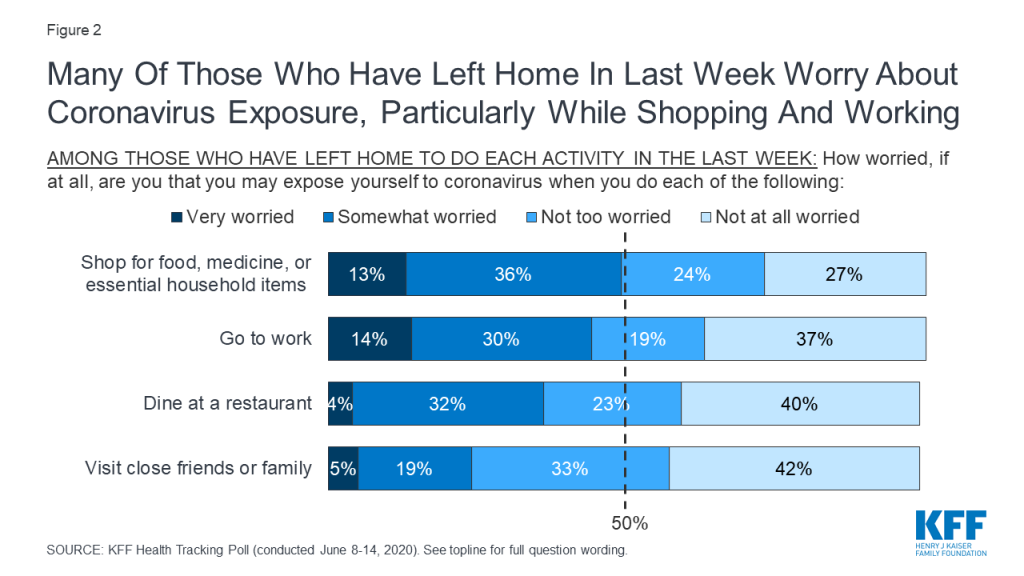
There are some partisan differences, both in engaging in activities outside their home, and how much they worry about exposing themselves to coronavirus when they do so. For example, Republicans are more than twice as likely as Democrats to say they have left home to dine at a restaurant at least once in the past week (46% vs. 21%). Even when looking at only those counties with more than 25 deaths attributed to coronavirus, this partisan difference remains with Republicans in those counties more likely than their Democratic counterparts to report leaving the house to dine at a restaurant (45% vs. 20%).
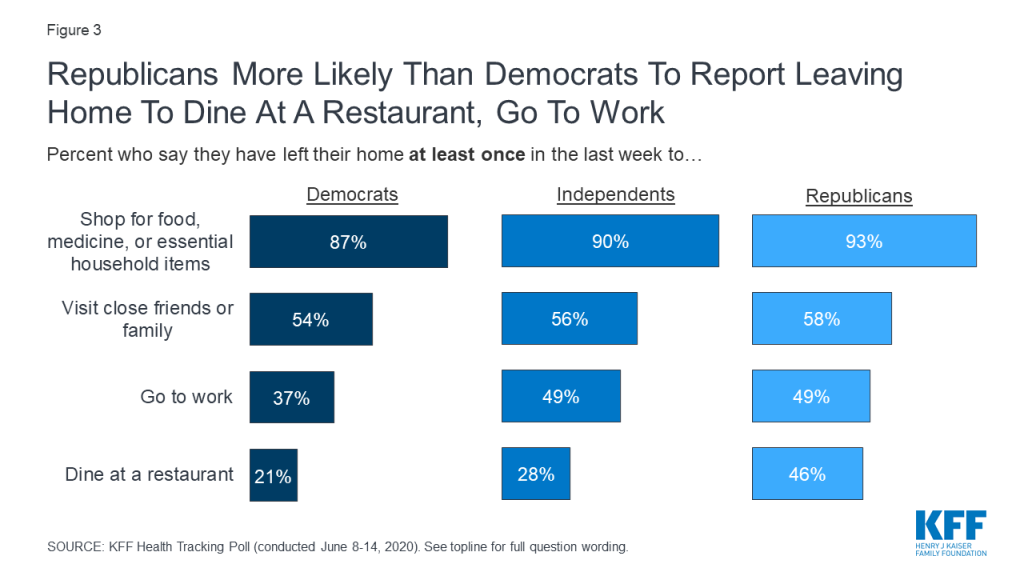
Among those who have engaged in each of these activities at least once in the past week, most Republicans say they’re not too worried about exposing themselves to coronavirus while shopping, going to work, dining out, or visiting friends and family. Among Democrats, most of those who’ve left their house to shop or go to work in the past week are at least somewhat worried about virus exposure (62% for each).
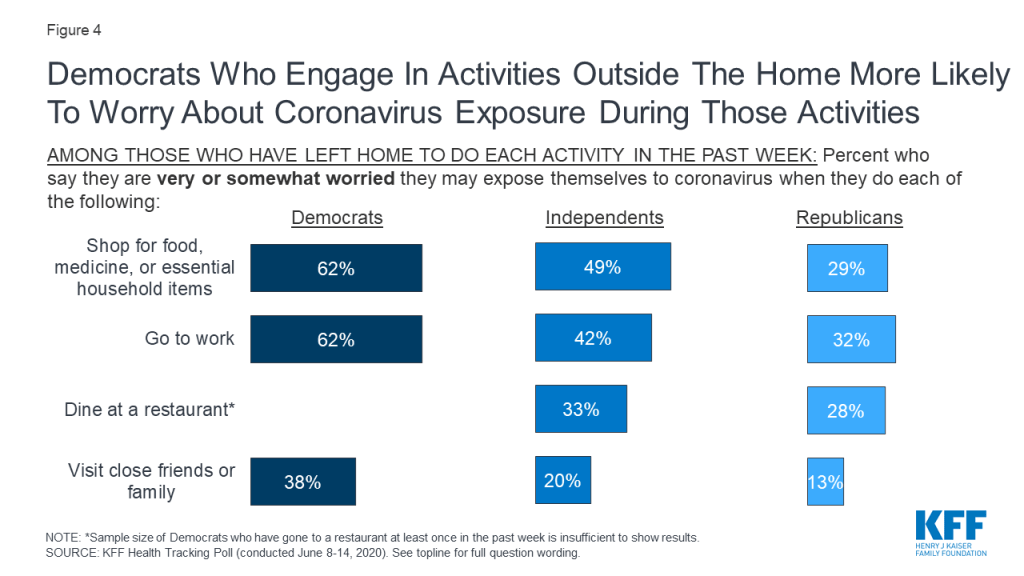
Half Say They Or A Household Family Member Skipped Or Delayed Care Due To Coronavirus, Most Commonly Dental Care And Routine Check-Ups
While many Americans report resuming some of their regular activities in recent weeks, many report putting off certain types of medical and dental care. About half of adults (52%) say that they or another family member living in their household skipped or postponed some type of medical or dental care in the past 3 months because of coronavirus. This includes 42% who say they personally skipped or postponed care.
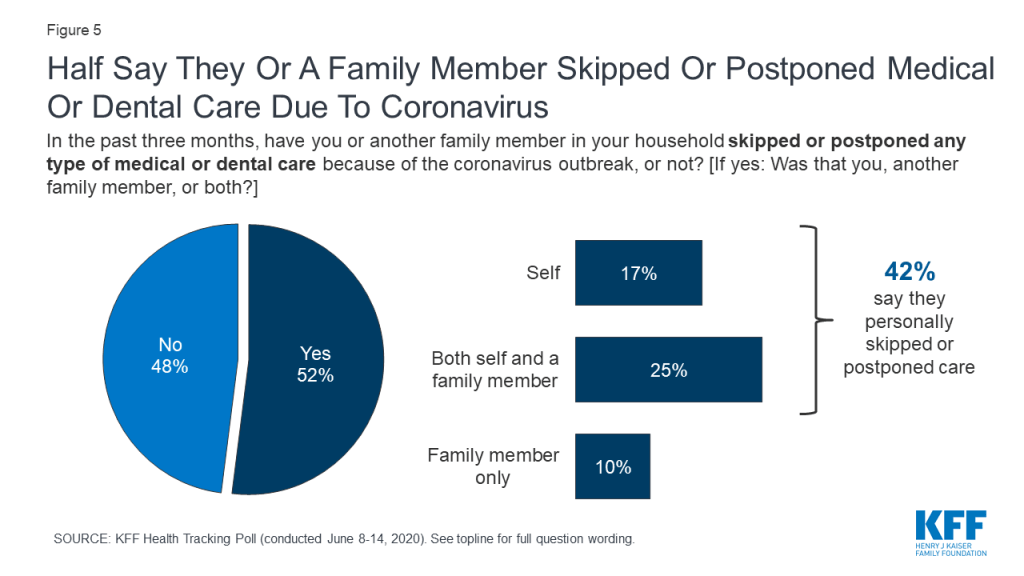
Women and older adults are more likely than their counterparts to say they personally skipped or postponed care. Those with higher incomes are also somewhat more likely than those with lower incomes to report postponing care, as are those with health insurance compared to the uninsured. This latter finding may reflect the fact that those with lower incomes or without insurance may use less care under normal circumstances, and so are less likely to report skipping or postponing visits due to coronavirus. Notably, the March 2019 KFF Health Tracking Poll found that about half of adults (51%) said they or a family member had skipped or postponed health care due to cost in the past year, with uninsured adults under age 65 (76%) and those with lower household income (62%) more likely than their counterparts to say they had skipped or postponed care.
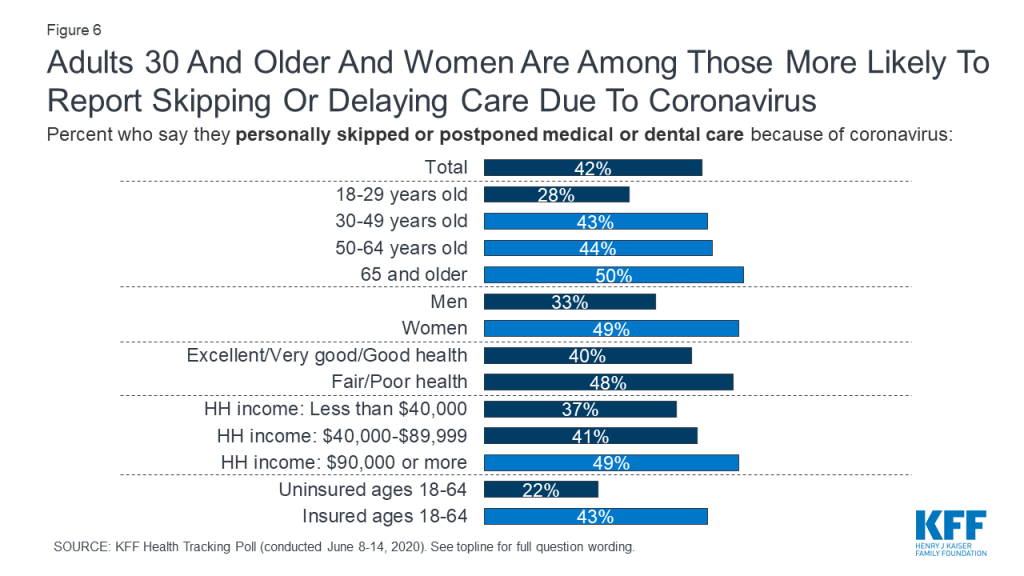
Among those who say someone in their household skipped or delayed care, the most common types of care missed are dental check-ups or procedures (71% of those who skipped or postponed care, or 37% of all adults) and regular check-ups or physical exams (58%, 30% of all). This is followed by about a quarter who say they or a family member skipped or postponed doctor visits for symptoms they were experiencing (28% of those who skipped/postponed care, or 15% of all adults), doctor visits for chronic conditions (25%, 13% of all), and preventive screenings (23%, 12% of all).
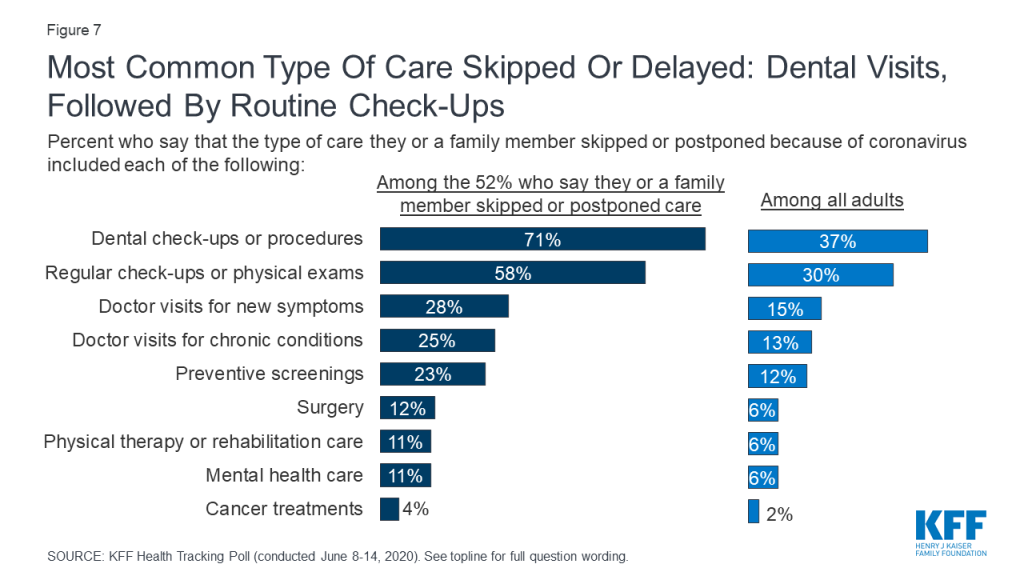
Overall, 27% of those who say they or a family member skipped or postponed care (14% of all adults) say that either they or their family member experienced a worsening medical condition as a result. When asked to name the condition that got worse, responses reflect the type of care that people report skipping or postponing, with by far the most common response being dental problems, named by 44% of those who say their own or a family member’s condition got worse after skipping care. Other responses include back, joint, or bone pain or problems (mentioned by 14% of those who say a condition got worse), eye or vision problems (7%), mental health conditions (4%), and kidney problems (4%). Since much of the care that people report skipping or delaying is in the form of routine check-ups and preventive screenings, it may be several months before the effects are recognized in terms of delayed diagnoses or missed opportunities for early treatment of cancers or other conditions.
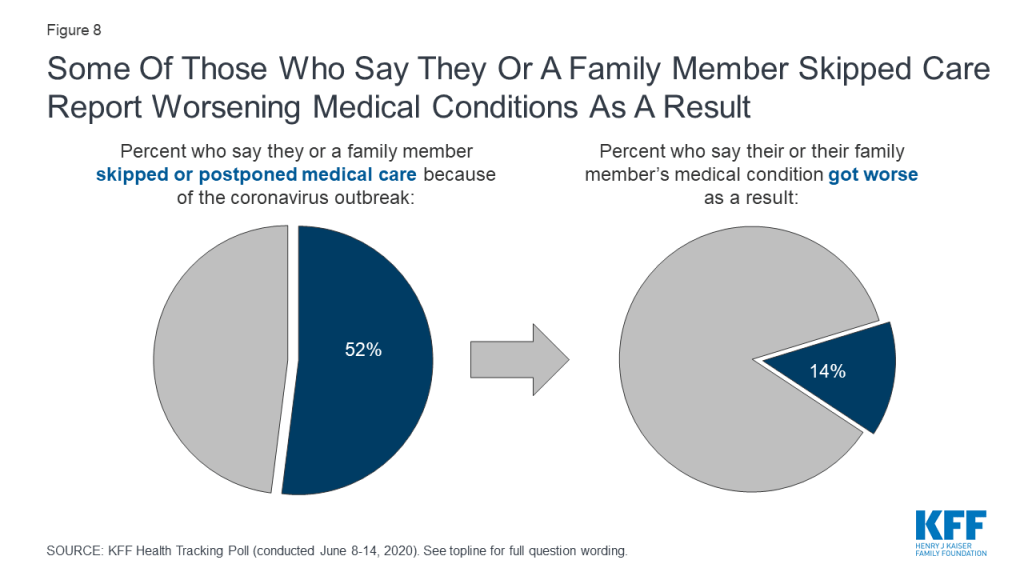
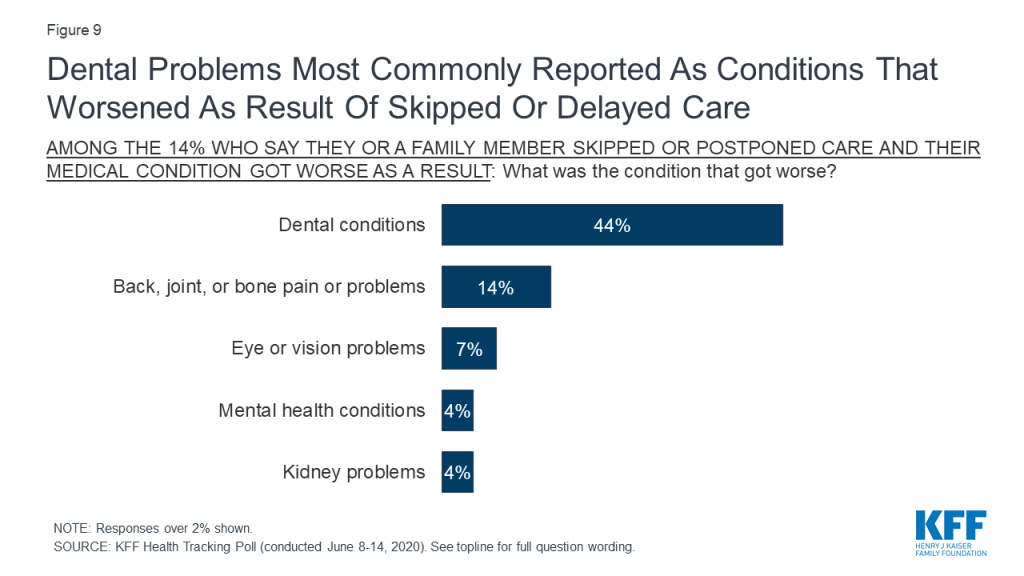
When asked about the details behind their reasons for skipping or postponing care amid the coronavirus pandemic, large shares report that the doctor’s office or facility was closed or offering limited appointments (82% of those who say they or a family member missed out on care, or 43% of all adults). About half (53%) of those who say they or a household member skipped care due to coronavirus (27% of all adults) say that they felt unsafe vising a doctor’s office or other medical facility during the outbreak. Far fewer (11% of those who say they or a family member missed care due to coronavirus, or 6% of all adults) cite cost or affordability concerns as a driving factor. While this question was asked specifically of those who said they skipped or delayed care because of the coronavirus, previous KFF surveys have found that prior to the pandemic, about half of adults said that they or a household family member had put off or skipped some sort of health care or dental care in the past year because of the cost.

Similar to results from the May 2020 KFF Health Tracking Poll, most of those who say they or a family member skipped or postponed care due to the pandemic say they expect to get the care relatively soon, with seven in ten saying they expect to get the care within the next 3 months. Indeed, with many states easing social distancing restrictions, a third (34%) of those who say they or a family member skipped or delayed care due to coronavirus expect to get care in the next month and 7% say they have already gotten the care that was delayed. Very few (2%) say they don’t expect to get the care that was skipped or postponed.
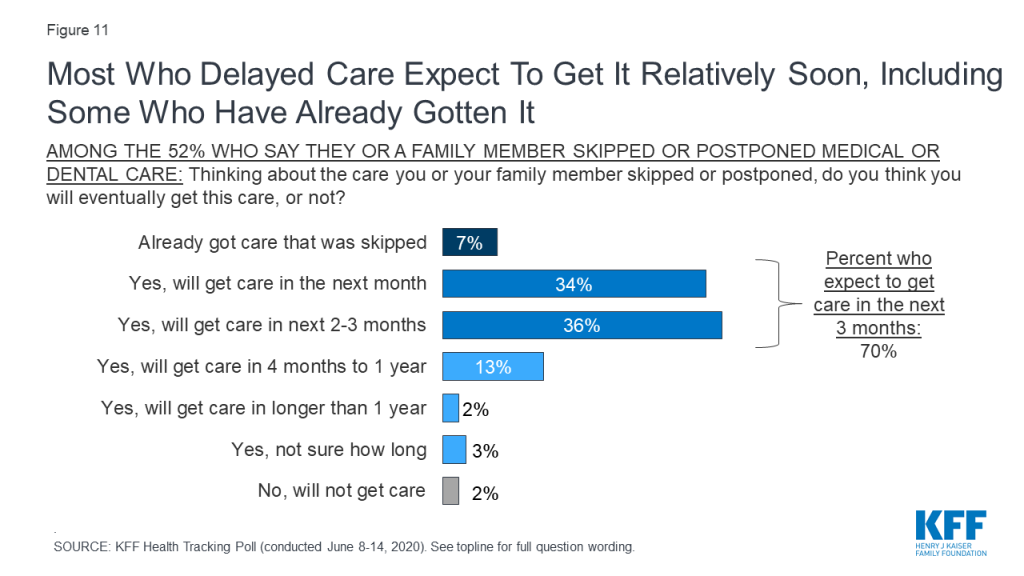
Joe Biden Has Edge With Voters On Most Issues, But President Trump Trusted More To Handle The Economy
In the midst of the coronavirus pandemic, an economic downturn, and weeks of protests against racism and police brutality, the latest KFF Tracking Poll looks ahead to the presidential election in November and examines how voters view the biggest problems facing the country, and which presidential candidate they trust most to handle them. Partisanship has a heavy hand in voters’ views when asked to say in their own words what they think is the biggest problem facing the country, with responses like “President Trump” (named by 17% of registered voters, including 31% of Democrats and 18% of independents), “political polarization” (named by 8% of voters), and “Democrats/liberals/the political left” (named by 7% of voters, including 19% of Republicans and 5% of independents) appearing among top responses to an open-ended question. Several of the issues driving recent news also appear among voters’ list of top problems, including racism and race relations (12% of voters, 20% of Democrats), coronavirus (7%), and the economy and unemployment (5%).
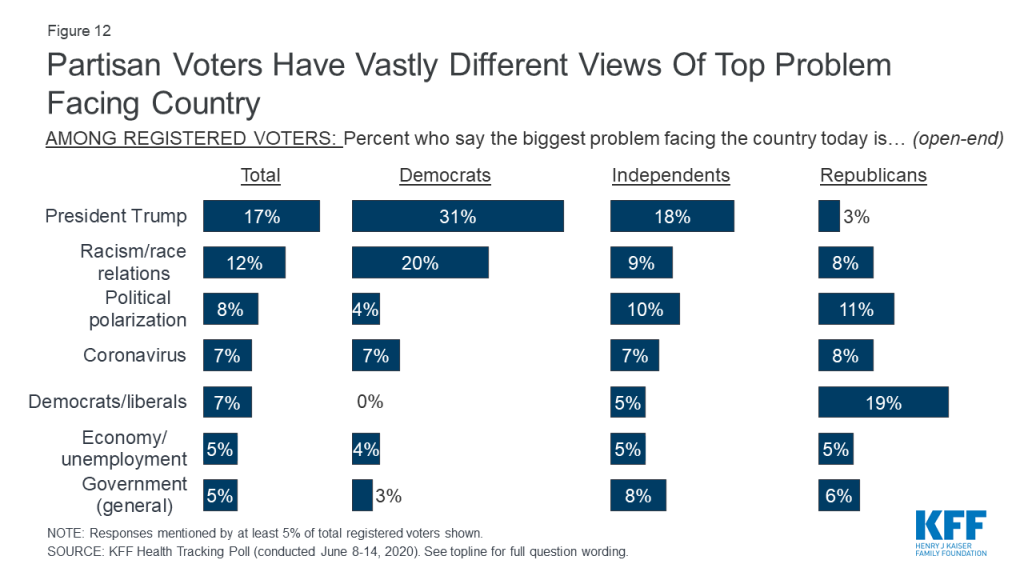
This month’s poll also takes a look at the critical group of swing voters who have not yet made up their minds about their vote for president in November. At least one in ten swing voters offer racism and race relations (15%), President Trump (10%), and political polarization (10%) as the biggest problems facing the country.
Defining Swing Voters
In this month’s poll, 30% of registered voters say they are “definitely going to vote for President Trump” and 37% say they are “definitely going to vote for Joe Biden.” Overall, 29% are defined as “swing voters,” including those who say they are undecided in their 2020 vote choice (7%) or are “probably” going to vote for President Trump (8%) or Democratic nominee Joe Biden (14%) but have not made up their minds yet.

When asked which candidate they trust to do a better job of dealing with various issues, more voters say they trust Joe Biden than Donald Trump in a variety of areas. This includes a roughly ten percentage point gap in favor of Biden on which candidate they trust to do a better job maintaining law and order (51% trust Biden vs. 41% trust Trump) and the coronavirus outbreak (50% vs. 41%). There are even larger gaps in favor of Biden on issues including health care (53% vs. 38%), police violence (55% vs. 36%), and race relations (58% vs. 34%). When it comes to handling the economy, similar shares of voters trust President Trump (49%) as trust Biden (45%).
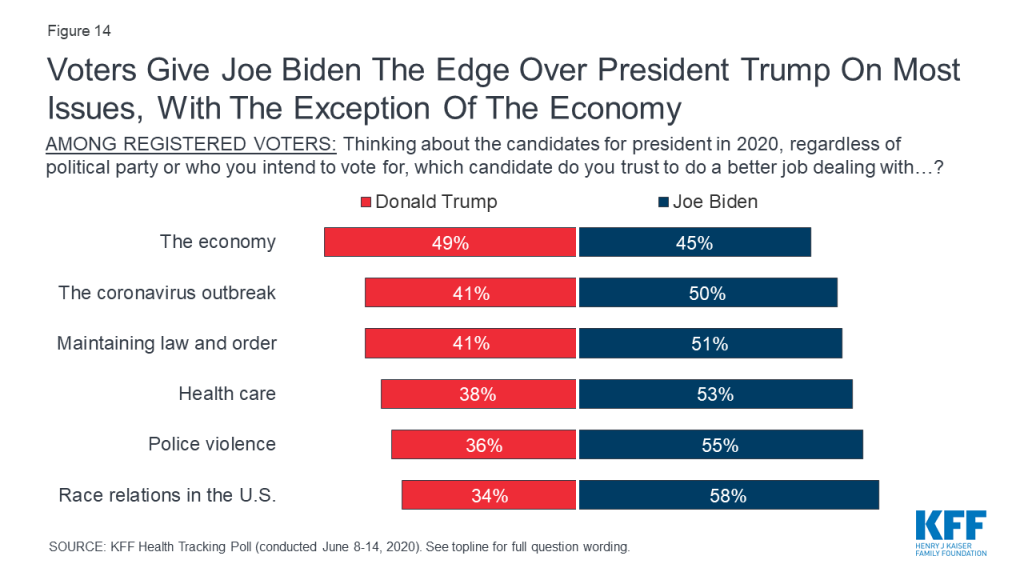
Not surprisingly, large majorities of voters from each political party say they trust their own party’s candidate to do a better job dealing with each of the issues tested in the poll. Among independent voters, Joe Biden has the clear edge over President Trump on trust to handle race relations (58% vs. 31%), police violence (54% vs. 35%), and health care (54% vs. 37%). Independent voters are more divided on which candidate they trust to do a better job on the economy (51% trust President Trump compared to 40% who trust Joe Biden) and to handle maintaining law and order (46% trust Joe Biden and 42% trust President Trump).
| Table 1: Among voters, partisans trust their party’s candidate to do a better job dealing with each of the issues compared to the other party’s candidate. | |||
| Percent of registered voters who trust each candidate to a better job dealing with each of the following: | Democratic voters | Independent voters | Republican voters |
| The economy | |||
| Donald Trump | 14% | 51% | 90% |
| Joe Biden | 81 | 42 | 8 |
| Maintaining law and order | |||
| Donald Trump | 6 | 42 | 87 |
| Joe Biden | 91 | 46 | 9 |
| The coronavirus outbreak | |||
| Donald Trump | 8 | 41 | 84 |
| Joe Biden | 86 | 49 | 10 |
| Health care | |||
| Donald Trump | 5 | 37 | 84 |
| Joe Biden | 91 | 54 | 11 |
| Police violence | |||
| Donald Trump | 4 | 35 | 76 |
| Joe Biden | 91 | 54 | 15 |
| Race relations in the U.S. | |||
| Donald Trump | 5 | 31 | 74 |
| Joe Biden | 91 | 58 | 18 |
Among swing voters who are yet to make up their minds, a slight majority (53%) trust Donald Trump to do a better job dealing with the economy (compared to 36% who trust Joe Biden). However, they are more likely to trust Joe Biden than to trust Donald Trump to do a better job dealing with all other issues tested, including majorities who prefer Joe Biden to better deal with race relations (66% vs. 20%), police violence (58% vs. 25%), health care (55% vs. 29%).
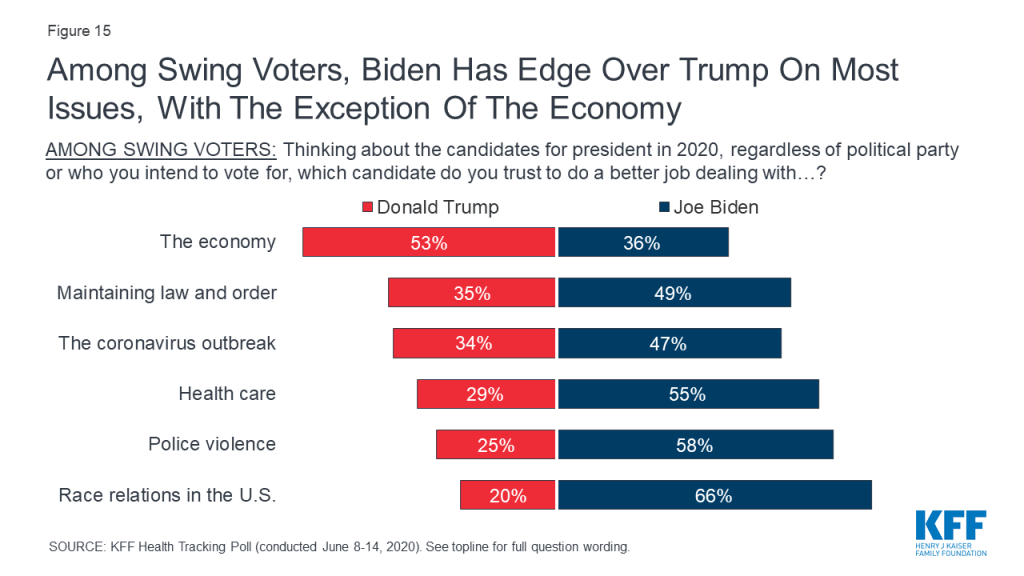
Methodology
This KFF Health Tracking Poll was designed and analyzed by public opinion researchers at the Kaiser Family Foundation (KFF). The survey was conducted June 8th-14th, 2020, among a nationally representative random digit dial telephone sample of 1,296 adults ages 18 and older, living in the United States, including Alaska and Hawaii (note: persons without a telephone could not be included in the random selection process). The sample included 291 respondents reached by calling back respondents that had previously completed an interview on the KFF Tracking poll at least nine months ago. Computer-assisted telephone interviews conducted by landline (297) and cell phone (999, including 719 who had no landline telephone) were carried out in English and Spanish by SSRS of Glen Mills, PA. To efficiently obtain a sample of lower-income and non-White respondents, the sample also included an oversample of prepaid (pay-as-you-go) telephone numbers (25% of the cell phone sample consisted of prepaid numbers) as well as a subsample of African American respondents who had previously completed interviews on the SSRS Omnibus poll (n=86). Both the random digit dial landline and cell phone samples were provided by Marketing Systems Group (MSG). For the landline sample, respondents were selected by asking for the youngest adult male or female currently at home based on a random rotation. If no one of that gender was available, interviewers asked to speak with the youngest adult of the opposite gender. For the cell phone sample, interviews were conducted with the adult who answered the phone. KFF paid for all costs associated with the survey.
The combined landline and cell phone sample was weighted to balance the sample demographics to match estimates for the national population using data from the Census Bureau’s 2018 American Community Survey (ACS) on sex, age, education, race, Hispanic origin, and region along with data from the 2010 Census on population density. The sample was also weighted to match current patterns of telephone use using data from the January- June 2019 National Health Interview Survey. The weight takes into account the fact that respondents with both a landline and cell phone have a higher probability of selection in the combined sample and also adjusts for the household size for the landline sample, and design modifications, namely, the oversampling of prepaid cell phones and likelihood of non-response for the re-contacted sample. All statistical tests of significance account for the effect of weighting.
The margin of sampling error including the design effect for the full sample is plus or minus 3 percentage points. Numbers of respondents and margins of sampling error for key subgroups are shown in the table below. For results based on other subgroups, the margin of sampling error may be higher. Sample sizes and margins of sampling error for other subgroups are available by request. Note that sampling error is only one of many potential sources of error in this or any other public opinion poll. Aduts of all racial and ethnic groups, including Asian, Pacific Islander, Native American, are included in the total, however only groups with sufficient numbers of responses to ensure statistical validity are broken out for individual analysis. Due to an inadvertent rounding error, an earlier version of this topline initially reported the net percentage of adults who attended a protest against police violence/in support of Black Lives Matter in Q14b/Q15 Combo Table as 10%. Kaiser Family Foundation public opinion and survey research is a charter member of the Transparency Initiative of the American Association for Public Opinion Research.
| Group | N (unweighted) | M.O.S.E. |
| Total | 1,296 | ± 3 percentage points |
| Registered voters | 1,094 | ± 4 percentage points |
| Party Identification | ||
| Democrats | 405 | ± 6 percentage points |
| Republicans | 305 | ± 7 percentage points |
| Independents | 465 | ± 5 percentage points |
| Race/Ethnicity | ||
| White | 811 | ± 4 percentage points |
| Black | 211 | ± 9 percentage points |
| Hispanic | 177 | ± 8 percentage points |
Cross-tabs
Endnotes
- “N.Y. Bans Chokeholds and Approves Other Measures to Restrict Police”. The New York Times. (June 12, 2020). https://www.nytimes.com/2020/06/12/nyregion/50a-repeal-police-floyd.html ↩︎
- “Amash, Pressley introduce bipartisan legislation to end qualified immunity” (June 4, 2020). https://amash.house.gov/media/press-releases/amash-pressley-introduce-bipartisan-legislation-end-qualified-immunity ↩︎
- “Communities of Color at Higher Risk for Health and Economic Challenges due to COVID-19”. KFF. (April 7, 2020). https://modern.kff.org/coronavirus-covid-19/issue-brief/communities-of-color-at-higher-risk-for-health-and-economic-challenges-due-to-covid-19/. ↩︎
- “COVID-19 in Racial and Ethnic Minority Groups.” Centers for Disease Control and Prevention. https://www.cdc.gov/coronavirus/2019-ncov/need-extra-precautions/racial-ethnic-minorities.html ↩︎